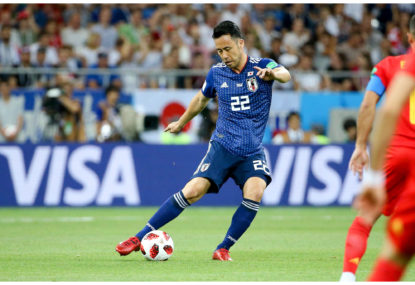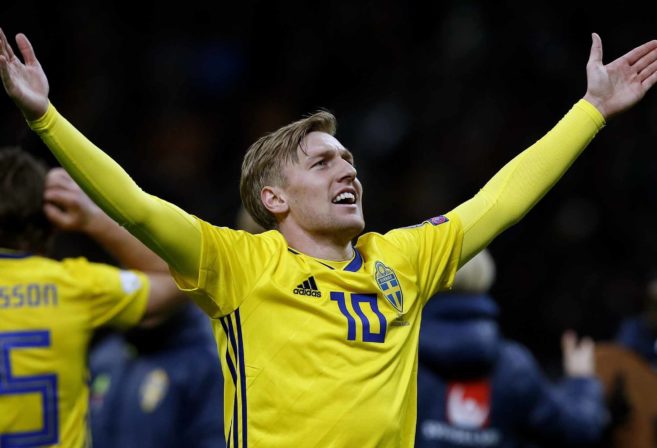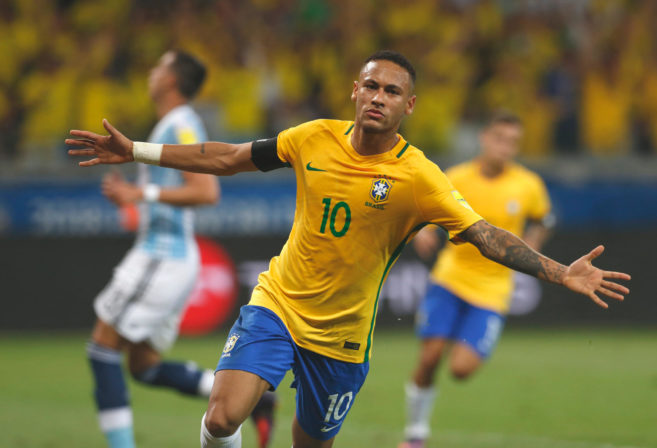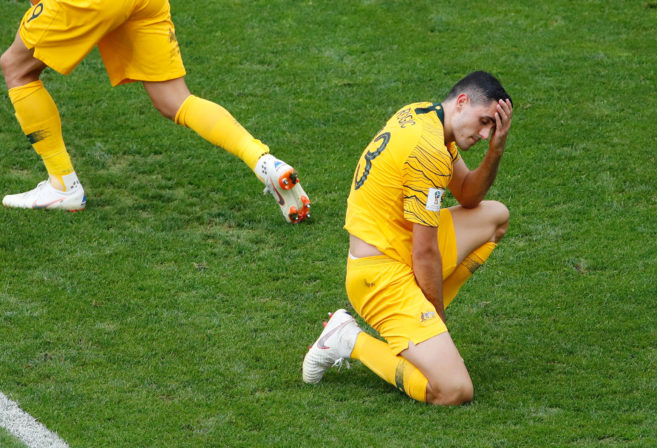Controversy as Villa keeper handed second yellow for shootout crowd taunting... but isn't sent off
Emi Martinez was saved by a new rule that resets yellow cards at the end of extra time, meaning his second yellow for taunting…

There’s an old saying in Russia. One of apt significance in this World Cup.
Roughly translated, it means – “Ride slower and you will get further”.
It’s a proverb that extols the virtues of patience and hard work.
If one is sensible and thorough, success is more easily achieved than by those who rush, eagerly expectant of success in a short period of time.
Teams that have ridden the wave of World Cup hysteria in Russia slower have got, well… further. It’s been the World Cup of the understated teams that make progress slowly and gently.
It has been those countries that do not enjoy the natural talent of perennial footballing heavyweights like Germany, Spain and Brazil. It’s been the World Cup of those that play without the flashy finesse of their counterparts and are devoid of mercurial megastars.
And it’s been a great factor in the edition’s success so far.
Take Russia for instance – a team on a rollercoaster ride of nationalistic pride, passionately cheering the Sbornaya to the quarter-finals.
A journey exceeding everyone’s expectations, least their own – Vladimir Putin didn’t even attend the round of 16 clash with Spain, perhaps born of an expected loss.
Russia fortuitously defeated Spain in the process and fell agonisingly short in a penalty shootout against a talented Croatian side.
It unleashed an ambitious momentum that has not been felt by a home side in a World Cup since the lofty heights reached by South Korea in the semi-finals of the 2002 World Cup.
How about England’s quarter-final opponents, Sweden? A side comprising 11 players, but playing as a team. A whole team. A rarity by modern footballing standards.

(AP Photo/Antonio Calanni, File)
While boasting a degree of natural talent and a tactically astute coach in Janne Andersson, the Swedes melded uncompromising work ethic and sheer willpower to top the ‘Group of Death’ – victories against the plucky South Koreans and perennial overachievers Mexico sandwiched a heartbreaking loss against World Cup holders, Germany.
How about Japan? Few would have predicted their progression in a group that also featured Poland, Senegal and Colombia.
Even fewer would have foreseen a victory against Colombia or a 2-0 lead against the highly-rated Belgium in a knockout match with 20 minutes remaining.
While eventually run down in the Round of 16, it is a testament, if not an inconvenient counterargument, as to why second-tier teams can cause an upset but lack the holistic wherewithal to win a World Cup.
But they remain competitive nonetheless.
What’s driving this influx in competition?
FIFA probably don’t want, nor need, an answer. Their insistence on a truly global event appears, for now at least, to be vindicated as a result of this new found competitive streak. Indeed, if a World Cup were to consist simply of the world’s 32 best sides, only Costa Rica, Tunisia, Senegal, Mexico and the United States would be representatives outside of Europe or South America.
And that’s hardly a strong advertisement for the ‘world game’.
There is a school of thought that this competition is simply part of the magic of a World Cup. Where high-pressure situations require precise decision making – decisions that quickly fade to mistakes in circumstances of miscalculation.
It is a certain recurring element that eventually consumes all, bar none.
Goalkeeper Fernando Muslera learnt the hard way with a jaw-dropping spill in Uruguay’s quarter-final against France, condemning the Uruguayans to certain defeat when, at times, one felt a comeback was brewing.
Marco Materazzi will certainly attest to its existence, so too Zinedine Zidane, following the latter’s infamous head-butting brain fade in the 2006 final.
And this so called ‘magic’ probably still gives Frank Lampard nightmares following the goal that wasn’t to be in England’s Round of 16 match against Germany in the 2010 World Cup, eventually consigning them to premature elimination.
The magic of the tournament has been present in at least one form or another at every World Cup and has again produced a myriad of moments and matches to rival each previous edition.
Is FIFA’s financing scheme finally starting to reap rewards for lower ranked countries? Unlikely.
A quick scan of the world rankings and each side’s recent results satisfies historical trends – that those rankings have remained reasonably consistent for the last four years and that lower ranked sides are losing as frequently or, in some instances, more frequently to superior opponents, as in the past.
Besides, rich footballing nations far outspend anything FIFA could ever disburse and effectively implement.
England, France and Germany possess impossibly advanced academies, training techniques and technology that usurp any of their poorer counterparts.
South American powerhouses like Brazil and Argentina have always had considerable wealth and footballing nous, but a borderline unhealthy fixation on one star player (Neymar for Brazil and Lionel Messi for Argentina) have meant that efforts to galvanise a side and cultivate exceptional performances have stalled in recent years.

(AP Photo/Leo Correa)
By 2022, Brazil won’t have reached a World Cup Final for 20 years – a preposterous failure by their lofty standards. Argentina barely qualified for the World Cup and even when they got to Russia, played like a shadow of their former selves.
Perhaps it’s all based on global interconnectedness. We live in an age where all information is at the touch of a fingertip. Mobility breaks down barriers and increases competition more so than in the past as a direct result of this.
Take Saudi Arabia, who entered the tournament as the second-lowest ranked side, behind Russia. The Saudis named a 23-man squad where all of their players ply their trade in the fledgling domestic competition.
Facing the prospect of a tough yet winnable opening match against Russia, the Saudis were outplayed, looking devoid of ideas and at times downright incapable of stopping a modest Russian attacking outfit.
Spurred on by rapturous home support, Russia ended with a resounding 5-0 win.
Saudi Arabia, renowned for its insularity, were either unwilling or incapable of looking elsewhere for footballing improvements – and their World Cup campaign paid an embarrassing and inevitably terminal price.
But the theory of interconnectedness is not confined to developing footballing nations.
Following England’s Round of 16 victory over Colombia, manager Gareth Southgate was asked about his side’s improved ability to win penalties and play the referee.
Faced with the prospect of a cynical match tactic, Southgate countered simply, “Maybe we’re getting a bit smarter. Maybe we’re now playing by the rules the rest of the world are playing by.”
Observing and learning how the rest of the world plays has undoubtedly improved the competitiveness of England at the World Cup, even when it does fall into unedifying grey areas of faking a dive and feigning an injury to benefit the team.
Seemingly, most if not all 32 participants at this year’s World Cup have unleashed their inner Machiavelli – as long as the ends justify the means, little is off limits.
Interconnectedness has given rise to coaching staff and players having greater access to technology, and by extension, support, than ever before.
The rampaging social media beast can easily facilitate Harry Maguire to shoot off a celebratory tweet to the Hull FC account, with a brilliant acknowledgement of his quarter-final goal against Sweden.
And we, the public, love it.
This close connection deconstructs previous sporting fallacies that superhuman players have superpower-like ability and as such, were previously inaccessible or untouchable.
It reiterates the humanity of sport – we can laugh along at ‘It’s coming home’ memes or be pleasantly surprised by a liked tweet from favourite players.
For a child, footballing heroes are no longer a world away, but merely a keyboard and a click. It galvanises national spirit and provides another avenue of support for the team – support that in the dying stages of a World Cup knockout match may be more useful than we may ever know.
Perhaps the true reason for this competitive World Cup, is simply, down to luck.
Even after an excellent performance against Belgium in the round of 16, it is still difficult to see Japan defeating 11 Colombians on the field, rather than ten.
Maybe the introduction of the VAR is skewing match results. A remarkable number of penalties has led to an influx of goals that may not have otherwise been scored.
The result – more competition – of which the Socceroos were both beneficiaries and defeated by.

(ODD ANDERSEN/AFP/Getty Images)
But does the VAR dehumanise sport by reducing mistakes, in the pursuit of perfection? What is the true cost of a competitive match? If it is within the rules of the sport, does it matter?
Ultimately, an improvement in competitive matches at the World Cup is a good thing. It invokes world-class football, empowers the neutral fan and partisan supporters alike and provides excellent entertainment – which is the true purpose of a global sporting event, no?
For the foreseeable future at least, there is still too much imbalance in the game to see this become the new competitive norm. Belgium still has most of their side playing world-class football in the Premier League. Most Japanese play in the J-League.
There is a great deal of difference between the standard of football that top-tier and second-tier footballing nations play to lead to overarching global change.
Many of these surprise results will be consigned to footnotes in World Cup history – invoking wistfully nostalgic sentiments every four years about Ghana’s run to the quarter-finals in 2010 or South Korea to the semi-finals of 2002.
But, if it is interconnectedness that is improving competition, there is no reason as to why results like this can’t occur on a more regular basis. And that’s something to look forward to in an increasingly unpredictable world.
If all else fails, at least the VAR can decide.